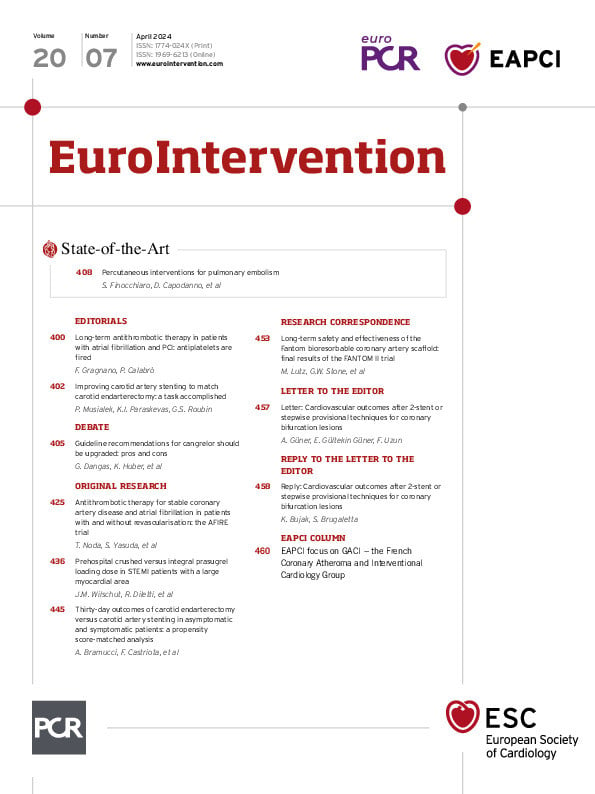Approximately 1 in 5 patients with atrial fibrillation (AF) undergoes percutaneous coronary intervention (PCI)1. Antithrombotic therapy in this population remains challenging, because antiplatelet and anticoagulant agents are generally prescribed together to prevent platelet-mediated coronary events (myocardial infarction, stent thrombosis) and cardioembolic events (mainly stroke); however, combining these agents increases the risk of bleeding1. Several randomised trials have provided substantial evidence to guide the management of AF-PCI patients during the first year after revascularisation2. Based on this evidence, current guidelines recommend triple therapy for ≤1 week, followed by dual therapy with direct oral anticoagulants (DOACs) plus single antiplatelet therapy (SAPT; preferably clopidogrel) as the default strategy1. Complete discontinuation of antiplatelet therapy is recommended (class I, level of evidence A) at 12 months after acute coronary syndrome or at 6 months after elective PCI1. However, the evidence supporting long-term oral anticoagulation (OAC) monotherapy in AF-PCI patients is not conclusive. Cardiologists are often hesitant to stop all antiplatelet medications, even long after PCI, mainly because of concerns about stent thrombosis. Hence, substantial numbers of AF-PCI patients continue to be treated chronically with OAC plus SAPT, an approach that contradicts guidelines1.
In this issue of EuroIntervention, Noda and colleagues3 report a timely investigation evaluating rivaroxaban monotherapy as a long-term post-revascularisation regimen in AF patients using data from the AFIRE (Atrial Fibrillation and Ischemic Events with Rivaroxaban in Patients with Stable Coronary Artery Disease) trial. The trial randomised 2,236 patients with AF and stable coronary artery disease (CAD) to receive rivaroxaban monotherapy (15 mg/day or 10 mg/day if creatinine clearance was 15-49 mL/min) or combination therapy with rivaroxaban plus SAPT (aspirin or a P2Y12 inhibitor)4. The study was terminated early because of excess mortality in the combination therapy group. Rivaroxaban monotherapy was non-inferior to rivaroxaban plus SAPT for the primary efficacy endpoint of ischaemic cardiovascular events and superior for major bleeding4.
The present subanalysis investigated whether the results of the AFIRE trial were consistent for patients with and without prior coronary revascularisation. Of 2,215 patients in the modified intention-to-treat population, 1,697 patients (76.6%) had undergone revascularisation more than 1 year before enrolment (1,445 with PCI, 252 with coronary artery bypass grafting [CABG]); 518 patients (23.4%) had angiographically confirmed CAD which did not require revascularisation3. In the combination therapy group, aspirin was the antiplatelet of choice for most patients. Compared with combination therapy, rivaroxaban monotherapy was associated with fewer ischaemic events in patients with prior revascularisation (hazard ratio [HR] 0.62, 95% confidence interval [CI]: 0.45-0.85; p=0.003) but not in those without revascularisation (HR 1.19, 95% CI: 0.67-2.12; p=0.554), with a signal for possible heterogeneity in the treatment effect (p-interaction=0.055)3. The relative risk of major bleeding was approximately halved with rivaroxaban monotherapy, regardless of whether patients had undergone prior revascularisation or not (p-interaction=0.633). The excess of deaths with combination therapy, which led to the early termination of AFIRE, was more pronounced in patients with prior revascularisation. The benefits of rivaroxaban monotherapy were maintained regardless of the revascularisation modality (PCI or CABG)3.
Some limitations should be noted. The post hoc design of this subanalysis3 and the open-label design of the parent trial4 had the potential to introduce bias. The trial was conducted in Japan4, and East Asian patients may differ in the pathobiology of their coronary events (plaque rupture, erosion, healing) and their response to antithrombotics4. The Japanese-approved dose of rivaroxaban was also used, rather than the globally approved dose4.
Despite these limitations, this subanalysis of the AFIRE trial3 supports the concept that adding SAPT beyond 1 year after PCI provides no further protection against thrombosis and significantly increases bleeding in AF patients receiving DOACs. This is in line with previous observational evidence suggesting that adding antiplatelets to vitamin K antagonist (VKA) therapy did not reduce coronary events or thromboembolism but led to more bleeding in AF patients with myocardial infarction or PCI ≥1 year prior5. Consistently, in the MASTER DAPT (Management of High Bleeding Risk Patients Post Bioresorbable Polymer Coated Stent Implantation With an Abbreviated Versus Prolonged DAPT Regimen) trial6, discontinuation of SAPT 6 months after PCI was associated with a similar risk of ischaemic events and ~50% lower bleeding risk than SAPT continuation in selected OAC-treated patients.
Why is additional platelet inhibition not protective? A mechanistic explanation may involve abnormal thrombogenesis in AF patients, in whom coronary clots may be fibrin-rich (rather than platelet-rich), leading to a greater protective effect of (D)OAC7. In addition, emerging evidence increasingly calls for early de-escalation strategies after PCI8, consistent with these new data3.
Taken together, AFIRE34 and other studies56 support current guidelines recommending OAC monotherapy from 6-12 months after PCI in AF patients1. Whether we can go further by stopping antiplatelet therapy from 1 month after PCI is being investigated in the MATRIX-2 (Monotherapy With P2Y12 Inhibitors in Patients With Atrial fibrillation Undergoing Supraflex Stent Implantation; ClinicalTrials.gov: NCT05955365) trial.
Conflict of interest statement
F. Gragnano and P. Calabrò have no conflicts of interest to declare relevant to the contents of this paper.

